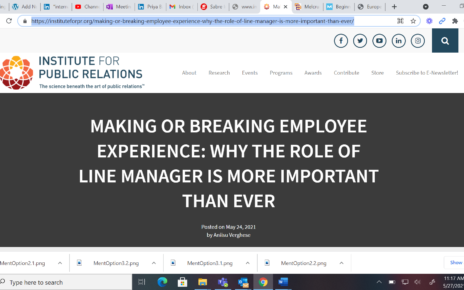Irrespective of the role you play, every day brings new challenges and opportunities at work and beyond. Life and work can be demanding if you are drawn in different directions and there is not a rhythm to your practice – as a professional, student, entrepreneur or homemaker.
In the Progress Principle, Teresa Amabile studied close to 12,000 diary entries from 200+ professionals working on 26 creative projects in 7 companies in 3 industries and discovered that making meaningful everyday progress is what led to the greatest motivation and improvement in performance. Other similar research studies provide evidence of the effects of every day practice. For example, the learning and performance showed a dramatic increase in dancers who practiced every day for weeks and months.
Managing yourself and then blending that with the practices that others have around you can help you your own time. What we do every day adds up to the weeks, months and years we spend in life. So structuring your day can have a dramatic effort on your overall effectiveness as an individual, as a professional and a colleague. Everyone’s daily schedule will vary based on the time and need – however building a plan is as crucial as sticking to it.
For communicators especially, the expectations are to be agile, creative, focused, balanced, calm and driven to progress with numerous and often complex, evolving projects. Having a daily practice can help bring method to the drill.
Here are a few pointers to integrate every day success into your work life and beyond.
· Get everyone on the same page: Agree on a format that works for all. Make it visual – a simple dashboard or a slide that gives your team and you an overview of all that is important and coming up will help.
· Discuss experiences: As a team, make time to discuss lessons learnt from the earlier week or the previous day. Very often, these nuggets of advice can reduce re-work and improve relationships with stakeholders. Just by sharing learning can help reset expectations about situations others might face in the future.
· Look for insights: Review metrics from channels, campaigns or events that you conduct and look for insights. Knowing what they say about your messages and audiences can allow you to improve communication planned later on.
· Understand people: Invest time to meet a few employees every day to understand their work and challenges. Look for opportunities and interventions you can do or bring back to the team for a discussion.
· Develop your expertise: Hone the fundamental skills needed by communicators in today’s world – digital, content and business collaborating. Invest in writing, creating and practicing these skills each day. Carve out time to read, enlist for online training or attend a seminar to gather valuable tips.
· Ask for feedback: Before you send out any communication, test it with a few people. Involve stakeholders on reviews. Sense check every day and make tweaks, if needed.
Write down what takes place in a ‘typical’ day of your life. How much time and effort goes into creating, reviewing, and writing, connecting, challenging or even ignoring distractions? That is your starting point for building your daily practice schedule. Daily practice results in opportunities to progress. Progress leads to small wins. Smalls wins over time leads to long term success.
What do you think? Have a daily schedule that works for you? Please share it here. Keen to learn more.
Found this article useful? Share your comments and send it your network. You can also look up other articles on my blog www.aniisu.com here or on Linkedin at: https://www.linkedin.com/in/aniisu/



